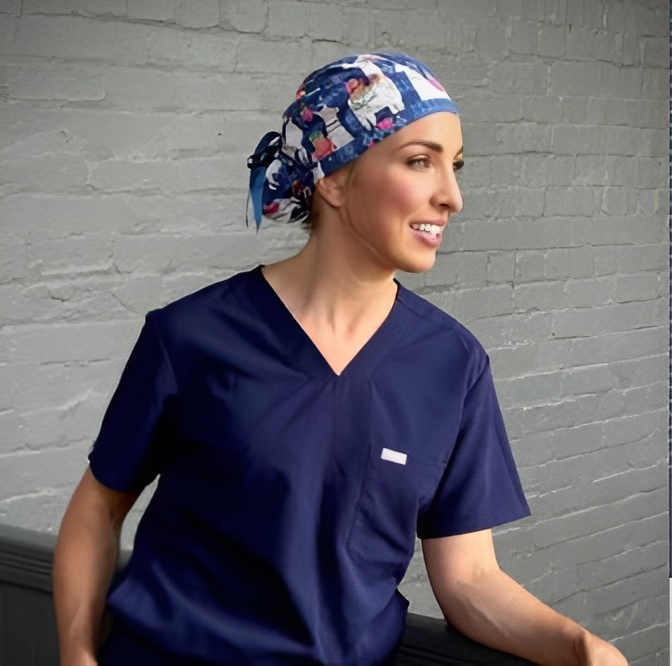Professional Experience
Dr. Caron-Cantin practices in both private clinic and hospital environments. She treats a wide range of eye conditions and performs surgical procedures. Her roles combine outpatient care, surgical work, and participation in community health initiatives.
- Current position and clinics: Ophthalmologist and cataract surgeon at the Montreal Retina Institute and Clinique Focale in Québec
- Hospital affiliation: Provides surgical and consultative services in hospital settings in Québec
- Previous roles: Clinical and research roles connected to university hospitals during training and early practice years
- Number of surgeries: Specific surgery counts were not publicly available. She performs routine and complex cataract procedures as part of clinical practice
- Leadership or mentorship: Involved in supervising trainees and contributing to team clinical care; specific leadership titles were not listed publicly
Academic Contributions
Dr. Caron-Cantin has participated in clinical research and academic activities. Her published work and research interests support improved screening and eye care delivery. She collaborates on projects that address public health and ophthalmic outcomes.
- Teaching positions: Involved in academic training during residency and likely participates in clinical teaching; formal academic appointment details were not publicly listed
- Lectures and training: Participates in knowledge transfer through clinical teaching and conference presentations when opportunities arise
- Research interests: Public health aspects of eye care, including diabetic retinopathy screening and access to care for diverse populations
- Course development or speaking: Engaged in educational activities related to ophthalmology; specific course titles were not publicly listed
Areas of Expertise
Dr. Caron-Cantin treats common and complex eye conditions. She focuses on procedures and care pathways that improve patients’ vision and daily functioning. Descriptions below use patient-centred language to explain common conditions and treatments.
- Cataract surgery: Removal of cloudy lens and implantation of an intraocular lens to restore clear vision. This includes standard and refractive cataract techniques
- Refractive lens replacement / Clear lens exchange: Lens replacement aimed at reducing dependence on glasses in selected patients
- General ophthalmology: Evaluation and treatment of common eye issues such as blurred vision, eye pain, and routine eye health maintenance
- Screening for diabetic eye disease: Identifying early signs of diabetic retinopathy to prevent vision loss. Special attention to access for diverse and immigrant populations
- Patient example: A patient with progressive blurring from cataract may be offered surgery with a premium lens to reduce their need for reading glasses after the procedure
Publications and Research
Dr. Caron-Cantin has contributed to peer-reviewed research that addresses screening and access to care. The studies support evidence-based approaches to detecting and managing eye disease in community populations.
- Diabetic retinopathy screening in immigrant populations: Co-authored a study examining screening rates and barriers among immigrants in Québec. The work highlights challenges in access and suggests strategies to improve screening coverage
- Other scientific articles: She is listed as a co-author on several publications related to ophthalmic public health and clinical practice. A full bibliography was not available in public profiles
- Profiles and identifiers: ORCID, ResearchGate or a complete PubMed author list were not fully enumerated in public clinic profiles
Patient Care Philosophy
Dr. Caron-Cantin emphasizes clear communication, empathy, and individualized care. She seeks to inform patients so they can make shared decisions about treatment. Her practice reflects attention to cultural sensitivity and patient access.
- Communication: Emphasizes plain language explanations to help patients understand diagnosis and treatment options
- Empathy: Focuses on listening to patient concerns and tailoring care to each person’s needs
- Patient education: Uses modern surgical options and visual aids to explain benefits and risks before procedures
- International and diverse patients: Demonstrates awareness of barriers faced by immigrant populations; details on telemedicine availability were not specified publicly
- Testimonials and outcomes: Clinic-level patient satisfaction is reported positively; specific patient case studies were not publicly shared in full detail
Professional Affiliations
Dr. Caron-Cantin is a certified specialist and a member of professional organizations in Canada. These affiliations support continuing professional development and adherence to national standards.
- Royal College of Physicians and Surgeons of Canada: Fellow (FRCSC), indicating specialty certification in ophthalmology
- Provincial association: Member of the provincial ophthalmologists association in Québec
- Clinical affiliations: Affiliated with the Montreal Retina Institute, Clinique Focale, and hospital institutions in Québec for clinical and surgical practice
- Certifications and licenses: Licensed to practice medicine and ophthalmic surgery in Canada; specific license numbers are not listed publicly
FAQs
- Is Dr. Marilou Caron-Cantin board-certified?
- Yes. She holds the FRCSC credential, which indicates certification in ophthalmology in Canada.
- What types of surgeries does she perform?
- She performs cataract surgery, refractive lens replacement, and related intraocular lens procedures. She also provides surgical care for standard ophthalmic indications in hospital settings.
- Does she treat international or non-local patients?
- Her clinical work focuses on patients in Québec. Her research shows attention to immigrant populations. Details about formal international patient programs or telemedicine were not specified publicly.
- How long is the typical hospital stay for cataract surgery?
- In uncomplicated cases, cataract surgery is usually performed as same-day outpatient surgery. Patients typically return home the same day unless there are medical reasons to stay longer.
- What languages does she speak?
- She practices in Québec and is likely proficient in French and English. Specific additional language skills were not listed publicly.
- Where does she practice?
- Her practice is based in Québec with clinical work at the Montreal Retina Institute, Clinique Focale, and affiliated hospital services for surgery and inpatient care.
- How can I learn more about her publications?
- Search public medical databases for her author name to find peer-reviewed articles. Clinic profiles may list representative publications, but a full bibliography was not provided in clinic materials.







